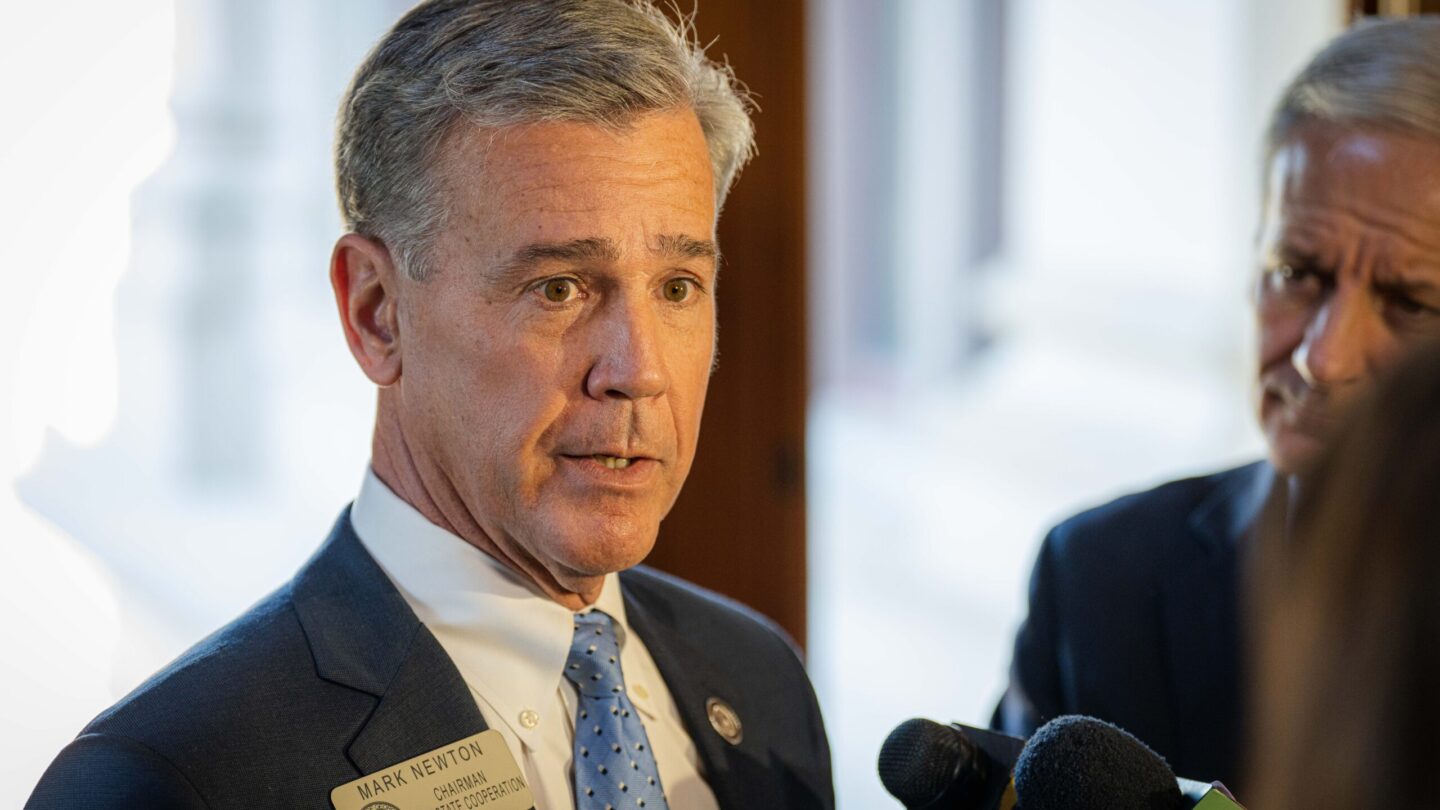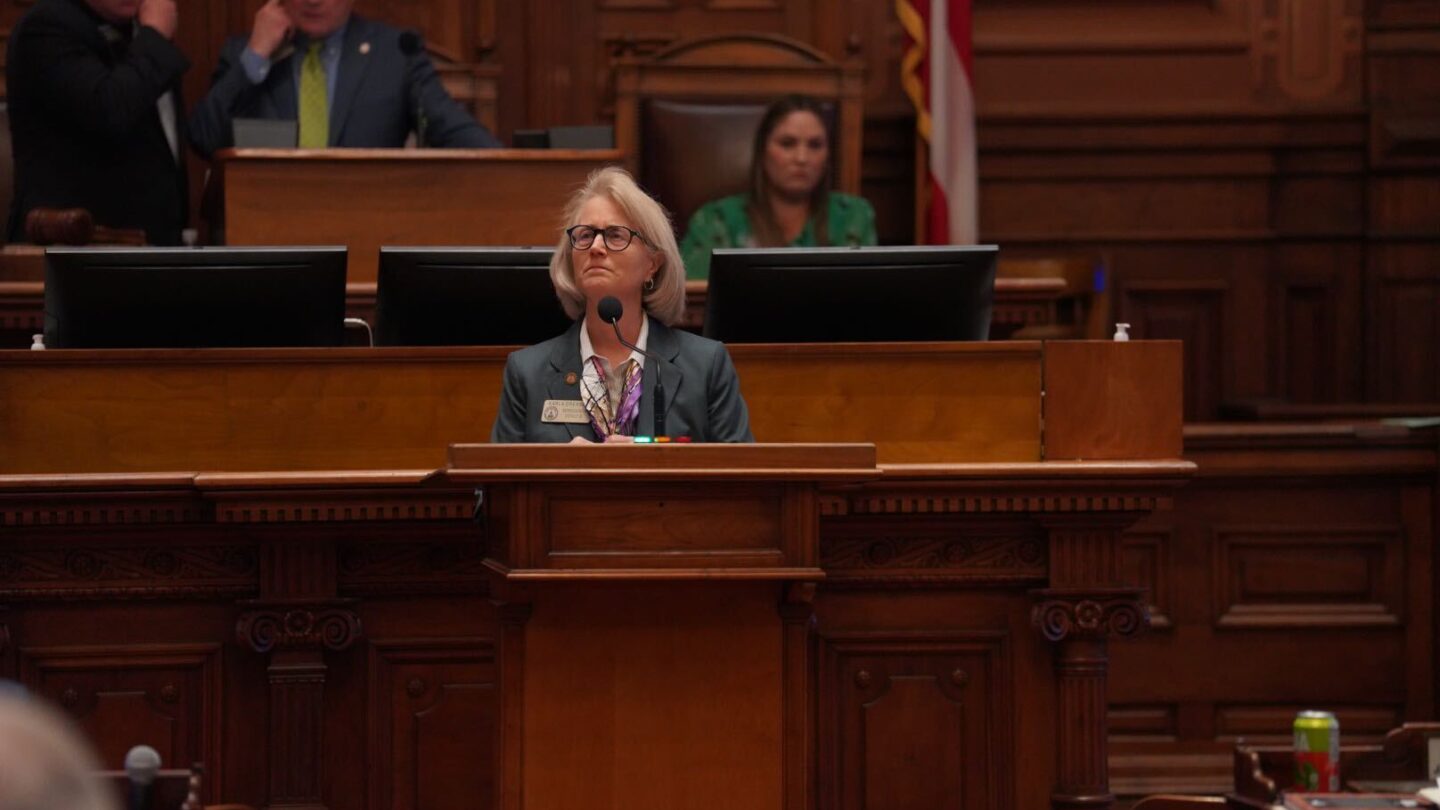Georgia House passes partial ban on transgender health care for minors

Republican state Rep. Mark Newton takes questions from the media after the Georgia House passed SB 140 on Thursday, March 16, 2023. (Matthew Pearson/WABE)
This story was updated at 4:10 p.m.
The Georgia House and Senate have voted to ban most medical treatments that help transgender kids affirm their gender identity.
The bill approved by the House on Thursday would prohibit providing hormone replacement therapy and gender-affirming surgery to minors. Doctors and health care providers who don’t comply could lose their licenses and potentially be exposed to criminal or civil liability.
SB 140 passed along party lines, with no Democratic votes. The Senate has already approved the measure. But because the House made an amendment to the bill, it needs to go back there one more time before it reaches the desk of Republican Gov. Brian Kemp.
“I think Governor Kemp’s going to be ready to sign this bill should the Senate agree and it go on to his desk,” said Republican Rep. Will Wade, one of the governor’s floor leaders. Wade clarified later in the day that he only hoped Kemp would sign it.
Democratic Rep. Karla Drenner, Georgia’s first openly LGBTQ lawmaker, implored her colleagues to vote against the bill.
“To all the children in our state who are going to be negatively impacted, don’t lose hope,” she said, fighting back tears. “Please don’t give up. Please don’t kill yourself. This world is worth it. We need you.”

The bill focuses on children experiencing gender dysphoria, the clinical term for the distress someone experiences when the gender they identify as doesn’t match the one they were assigned at birth. The American Academy of Pediatrics recommends that doctors provide children with “comprehensive gender-affirming and developmentally appropriate health care.”
That typically begins with months or years of counseling and care from a team of specialized health care providers before any medical interventions to help a child align with their gender identity are prescribed.
Puberty blockers, which delay puberty and are usually the next step in that process, would still be allowed under the bill.
“This bill is simply to pause and allow people, allow young people to be a little bit more mature before they make a decision that is 100% irreversible,” says Republican Sen. Carden Summers, who sponsored the bill. “Because once you have the surgeries, there’s no going back.”

The American Academy of Pediatrics says that gender-confirming surgery for minors is uncommon and should be considered on a case-by-case basis.
Still, opponents of the bill have underlined the irreversible consequences of denying care to young people who decide with their parents and doctors that they need it.
“I would not be able to attend college, my little brother would not have someone to bother every single day. I would not be here,” Georgia State University freshman Leonardo Hinnant told lawmakers earlier this week. “This bill would restrict essential care for transgender minors, care that I know is the reason why I am living today.”
A 2021 study by the Trevor Project found that transgender youth who received hormone therapy had lower rates of depression and suicide attempts than those who did not. Transgender children already experience higher rates of suicide and depression than other kids.
Democratic Rep. Michelle Au, also expressed concerns about the state forcing doctors to ignore best practice established by professional medical societies.
“Why should politicians be able to pass laws that supersede established medical care standards?” Au said. “What patient would prefer their medical care be dictated by a politician rather than a doctor?”

Republican Mark Newton, also a physician, disagreed.
“The state has indeed intervened between the patient and their doctor,” Newton said. “Why did they do that? They did it because it was needed to protect patients, to protect Georgians, which is our role here.”
The bill has drawn some of the most emotional debate of the session.
Nearly 60 people signed up for public comment when SB 140 came up in committee on Tuesday. As the audience spilled out of the at-capacity hearing room following a vote to advance the bill, some of those who came to testify in opposition began crying.
The legislation is one of a flurry of bills being proposed in Republican-led legislatures around the country targeting transgender people.
Alabama, Arkansas, Arizona, Florida, Mississippi, South Dakota, Tennessee and Utah have all passed some form of legislation prohibiting healthcare for transgender people. The laws in Alabama and Arkansas are wrapped up in legal challenges and are now on hold.
Last year, Kemp signed a bill paving the way for prohibiting trans kids from playing school sports on the team that matches their gender identity.
A recent NPR analysis found that state lawmakers introduced at least 306 bills targeting trans people in the last two years – more than any previous period. Eight-six percent of those bills focused on trans youth.








